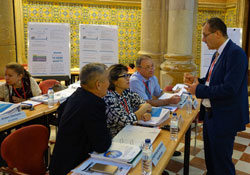Training supports transformation of health systems to end TB

WHO
WHO/Europe organized the second WHO Barcelona course on health systems strengthening for improved tuberculosis (TB) prevention and care in order to support the transformation of the financing and delivery of TB services in the WHO European Region.
The course, held on 16–20 October 2017 in Barcelona, Spain, brought together 45 participants from Armenia, Azerbaijan, Belarus, Bulgaria, Georgia, Kazakhstan, Kyrgyzstan, the Republic of Moldova, Tajikistan, Ukraine and Uzbekistan. These are target countries for the Tuberculosis Regional Eastern European and Central Asian Project (TB-REP), which seeks to transform health systems to end TB.
The course targeted decision-makers, senior officials and high-level health system administrators from ministries of health and finance; managers of national TB programmes, health insurance funds and service delivery organizations; and experts and leaders who play key roles in the implementation of health system reforms related to TB prevention and care.
Strengthening health systems to improve TB outcomes
In 2015, more than 40 000 people lost their lives to TB in the Region. The Region’s 53 Member States bear about 5% of the global TB burden in absolute numbers, but 25% of the burden of multidrug-resistant TB (MDR-TB). MDR-TB requires treatment over a longer period, is complex and expensive to treat, can cause more side effects, and has a lower probability of treatment success.
There is growing consensus among experts that a holistic approach to strengthening health systems is needed in order to improve TB prevention and care. Reforming TB services in isolation from the rest of the system is unlikely to succeed and create lasting impacts.
In response to the situation in the Region, the 5-day course provided theoretical and practical training in an integrative, whole-system framework. It used a case-based training methodology across all of its 5 modules:
- analysing and diagnosing health system performance;
- improving the delivery of people-centred TB prevention and care;
- improving health system financing;
- improving governance and management of change; and
- developing country-specific system diagnostics and reform proposals.
Building national capacity for designing, adapting and sustaining people-centred TB care
The course explored barriers in creating an equitable, efficient and sustainable health system environment to prevent, treat and manage TB. It provided participants with skills and tools to assess health system barriers; to support policy-making, planning and implementation of new models of TB care; and to equip health leaders and managers with knowledge of the whole-system approach for better health outcomes.
“We are currently undertaking proactive reforms of the health-care financing system in Armenia,” explained Arsen Davtyan, Head of the Economic and Financial Flows Management Unit of Armenia’s State Health Agency of the Ministry of Health. “At this course, I learned about innovative approaches and experiences of other countries. Importantly, I also learned that before initiating the process of reform, it is necessary to investigate the context of the entire health system, specify problems and priorities, carry out diagnostics of the problems to get to the root causes, and base the directions of the reform process on the solutions.”
Another participant, Marine Janjgava, Head of Control and Management Service at Georgia’s National Center for TB and Lung Diseases, said that the course “will support us in developing a new model of health financing to ensure successful TB management in Georgia”.
Andrei Karnialiuk, Deputy Head of Health at the Department of Health of the Brest Regional Executive Committee in Belarus, noted the value of sharing experience: “This course helped us broaden our horizons and learn about the progress in other countries, especially given that countries participating have all had the same highly centralized Semashko system.”
Yuliya Chorna of the TB Europe Coalition and the Alliance for Public Health in Ukraine highlighted that the course “helped me look beyond the challenges in organization of TB care to root causes and solutions”. She noted that “approaches to TB should move to a biopsychosocial model through the integration of health and social systems, with civil society playing a critical role in addressing the emotional, psychological and social needs of people with TB through qualitative community care”.
Oxana Domenti, Co-Chair of the European and Central Asian Branch of the Global TB Caucus, emphasized the value of intersectoral work: “At the course, we were a group of people from different sectors and levels of decision-making engaged in TB control. The course helped us understand the complexity of solutions through intersectoral cooperation and interaction with partners at different levels – legislative, executive, community and individual. Speaking as a member of the Executive Committee of the Global TB Caucus and a Co-Chair of the regional branch of this network – a unique global network of parliamentarians united by their shared commitment to end the TB epidemic – I believe that the course provided strong support for further cooperation of the legislators from eastern Europe and central Asia in order to increase our contribution to the necessary transformations.”



